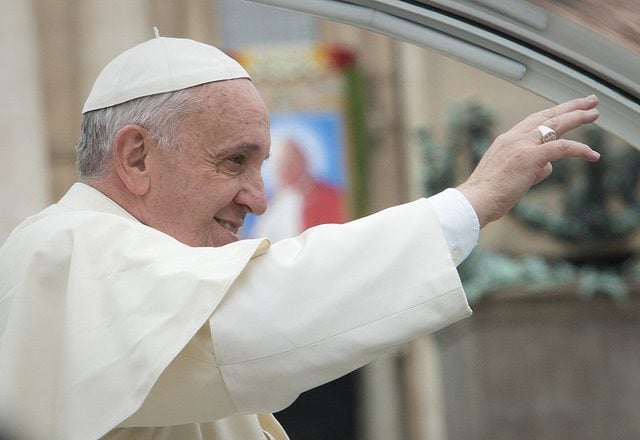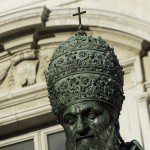
So I sat down to write something entirely different but then I read Pope Francis’s homily from this morning and completely changed my mind.
Today’s gospel reading, according to the Lectionary, is about Jesus’s encounter with the Pharisees. It’s one of the famous encounter, you’ll recall, where the Pharisees question the authority of Jesus. They question Him and His disciples who are plucking grain and traveling (or working) on the Sabbath, the Jewish holy day, and healing and performing miracles. They questioned Jesus’s observance of the Jewish Law. It’s a truly interesting encounter and one with particular resonance and application when thinking about Catholicism.
See, as a younger Protestant we always, always, used Jesus’s verbal scrums with the Pharisees—his disdain and downright malevolence towards their religious practices—as ammunition against the Catholic Church. We did this. Even if it wasn’t necessarily explicit, and it often wasn’t, when we talked about the Pharisees—when we talked about being “religious” like it was a bad thing—we were referring to Catholicism.
I submit, dear readers, that I was wrong.
I was wrong and stupid to naturally equate religion with the Pharisees. I was wrong and stupid to automatically create that equation: The Pharisees were religious, Jesus condemned the Pharisees, therefore religion is bad.
I was stupid, but condemning religion based on Jesus’s condemnation of the Pharisees is nothing new.
I’ve recently heard Jesus’s encounter with the Pharisees explained in a different way though and Pope Francis, in his homily, echoes this similar explanation.
You have to remember, and we often forget, that the Pharisees were holy people. They were a sect of Jews who were trying their level best to follow the Jewish laws and customs. They wanted to live right by God. They truly did. This is abundantly clear from Scripture and from Jesus’s own words. He doesn’t come on the scene and lambast them for trying their best, he comes on the scene to tell them that their religiousness has to extend into their hearts.
Jesus didn’t come to condemn their religiousness, that can be found nowhere in the words and deeds of Jesus. He came to condemn their hearts.
Speaking about the Pharisees Pope Francis said,
They were strong, but on the outside. They were in a cast. The heart was very week, they didn’t know what they believed. And because of this their life, the outer part of their life, was completely regulated, but the heart was otherwise: a weak heart, and a skin that was plastered over, strong, harsh. Jesus, on the other hand, teaches us that the Christian should have a strong heart, a firm heart, a heart built on the rock, that is Christ; and then, in the way it goes out, it goes out with prudence.
What we forgot, or never knew, in my Protestant community was that Jesus never said there was anything wrong with religion. The problem Jesus tackled, and strongly condemned, was a religious practice missing the true, converted heart. What Pope Francis called, in his homily, “strong heart, a firm heart, a heart built on the rock, that is Christ.”
A heart geared towards doing God’s will, not just appearing to.
But the Catholic became the Pharisee, and the Catholic was an easy target. The religious trappings of Catholicism are thick. Catholic churches are ornate and extravagant. Catholics collect things like rosaries, statues, and crucifixes. Catholics sit down, stand up, and knee will alarming frequency. Catholics are an obvious analogue for Pharisees, and vice versa but if we aren’t careful we miss Jesus’s point entirely.
Jesus’s point was that our heart has to be right, our motives have to be right, and it can’t be merely about outward practice. The Pharisees Jesus condemned were trying to live according to God’s laws but they also wanted to be seen to be living according to God’s laws—they put their righteousness on display. Jesus didn’t condemned their pious religious practice in the same way that He wouldn’t, today, condemn the pious practice of Catholics. Jesus condemns the Catholic, the Protestant, or the Jew who is practising for the sake and sight of others, with what Pope Francis called “rotten hearts.”
As I begin to find meaning, beauty, and a fulsome depth in much of the ancient, Catholic religion it pains me that some might condemn me as a Pharisee. I hope I can do my part to cordially explain myself, and this is part of that. That religious practice—that religion—can be a pointer to Christ, can be wholly good and right and true and that it’s the heart that matters. That Jesus didn’t come to condemn religion, He came to make sure we practice it right.

















